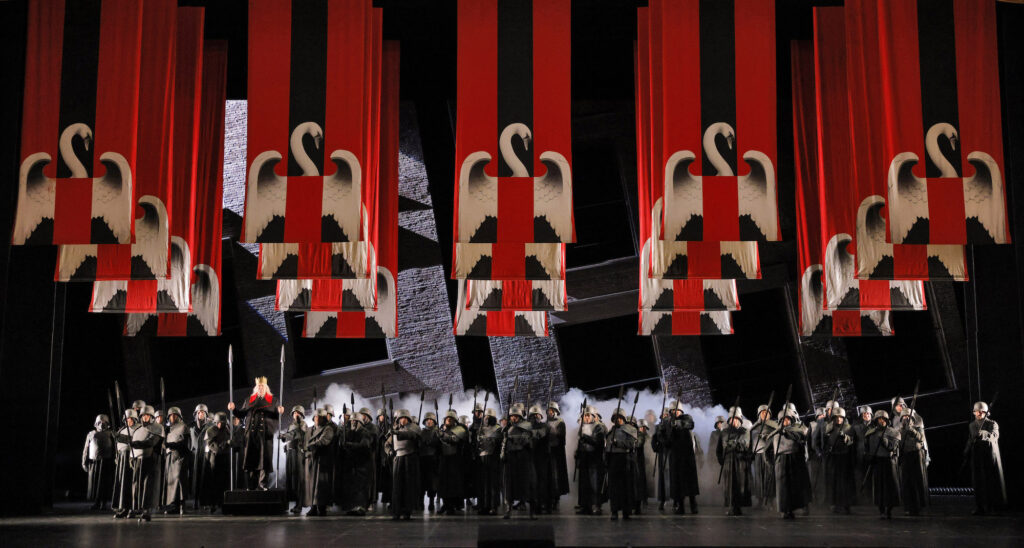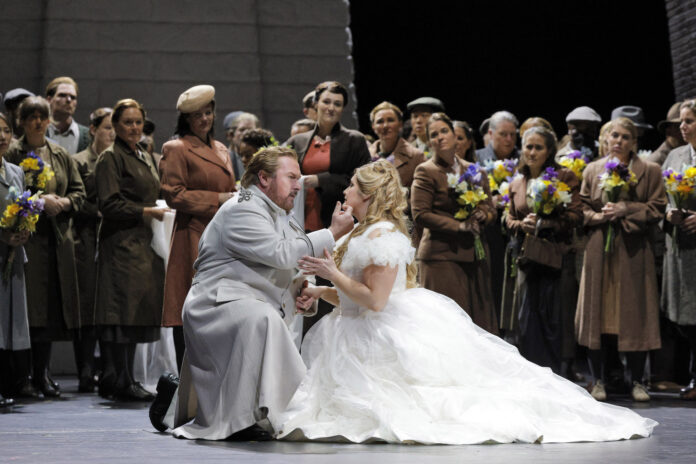Oh, Lohengrin (through November 1 at the War Memorial Opera House, SF), you really are the best and worst of Wagner, aren’t you? Distinctively bombastic, unexpectedly iconic—this is where the “Bridal March” originates— and reveling in epic German folklore. Yet, you also exemplify your composer’s penchant for bloat.
Let me put it this way: when a young actor appears at the climax of this four-and-a-half-hour opera, I couldn’t help but think “Isn’t it past that kid’s bed time?” It was quite a journey to get there from the pre-show curtain speech.
On this particular night, said speech included a disclaimer about war imagery for those triggered by the ongoing conflicts in Ukraine and Gaza. It attempted to remain apolitical in its text, but war is an overtly political act as much as an ideological one, so attempting to remove either is to try to ignore the war itself.
After all, the opera begins with the king (Icelandic bass Kristinn Sigmundsson) drafting the men of Brabant into war against the Hungarians. It’s doubtful any of them know exactly what they’re fighting for, but hey, fresh meat for the grinder. (It should be noted that the though the scenario remains the same, the setting has been moved to early 20th century Europe.) But this is opera, so all that war guff has to take a back seat to romantic entanglements.
In this case, the king has been asked to sit in judgement over the apparent nullification of a betrothal. It starts with Friedrich (US baritone Brian Mulligan) telling of how he raised the children of the late Duke. Friedrich now feels entitled to wed the elder child, Elsa (US soprano Julie Adams), because like every Nice Guy™, Friedrich thinks being nice to a woman means you get to bed her. One day, she and her brother Gottfried went into the woods, from which only she returned. Friedrich, who has since married the conniving Ortrud (Hungarian mezzo Judit Kutasi), wants Elsa charged with the murder of her brother, and for Friedrich himself to be named Duke of Brabant.
Elsa seems pretty aloof as to what actually happened to her brother in the woods, which does her no favors when Friedrich demands trial-by-combat to settle the matter. Fortunately for Elsa, her champion (New Zealand tenor Simon O’Neill) arrives on the back of a swan to defeat Friedrich with very little effort. The king is eager to have a guy like that on his side, so he recruits the supernaturally skilled knight to fight the Hungarians. Our knight agrees to this and to marry Elsa, on one condition: she can never ask him his name. That would be the end of his gifts.
If you’re not familiar with this particular German tale, you’ve probably already guessed our hero’s name due to similarities to that other German tale of the magical being who loses his power once his name is spoken. You may have also noticed parallels to the myth of Cupid and Psyche, though with considerably less hot oil and cliff-jumping suicide. The storytelling ancestry of Lohengrin remains and intriguing look into the history of European mythologies and folk tales.
Still, it’s chockful of filler and multiple anti-climaxes. Characters bloviate ad nauseum, as if Wagner (also the librettist) were simply looking for words to fill the grand score he’d conceived. It is a magnificent score, and excellently conducted by Eun Sun Kim in—as SF Opera’s advertising states— the first-of-many trips she plans to take to Wagnerville. But when the swan-friendly knight wins every battle in a matter of seconds, it can’t help but deflate some of the tension moving forward, no matter how much we delight in watching Friedrich and Ortrud plot their revenge.

If Conductor Kim somehow isn’t the production’s star, then it would have to be set designer Paul Steinberg. With the new early 20th century setting, Steinberg’s German Expressionist set (coupled with Simon Bennison’s lights) is something out of a Fritz Lang or Michał Waszyński film. The curtain first rises on a still tableau of several supernumeraries frozen like deer in headlights from a blinding spot. The brick buildings of Brabant are all slanted and perpetually in shadow, even when lit. In fact, the most illuminated set piece is during the wedding, after the king has adopted the swan as his standard. The visual reminiscence to another German eagle is not accidental, especially on the blood flags seen later. It’s a bold and stunning display to be sure.
As I was watching a livestream, I wasn’t on hand to take readings of the CO² levels in the Opera House. I did, however, notice almost no masks amongst the audience and staff in the pre-show or intermission footage. I did notice a few masks on front-row audience members when members of the wedding party ran through the aisles. (There’s also a scene in which Ortrud toasts the other characters from one of the Opera House’s audience-left boxes.) Yet, the most surprising mask was the one worn onstage: near the end of Act 1, a woman on stage was wearing a black N95. Given the way her face appeared to move, I’m guessing she was a chorus member rather than a supernumerary. In any case, the mask didn’t seem to impede her performance at all.
At four-and-a-half hours, Lohengrin keeps one invested with a strong, talented ensemble performing over a timeless score on a fantastic stage. In a way, it’s a great promotional piece for livestreaming, both for SF Opera and for other troupes: As jaw-dropping as it must be to see it in person, it’s one of those famous operas that will take up an entire evening. Classic or not, it’s a lot easier to absorb from the comfort and safety of one’s own sofa.
LOHENGRIN runs through November 1 at the War Memorial Opera House, SF. Tickets and further info here.





